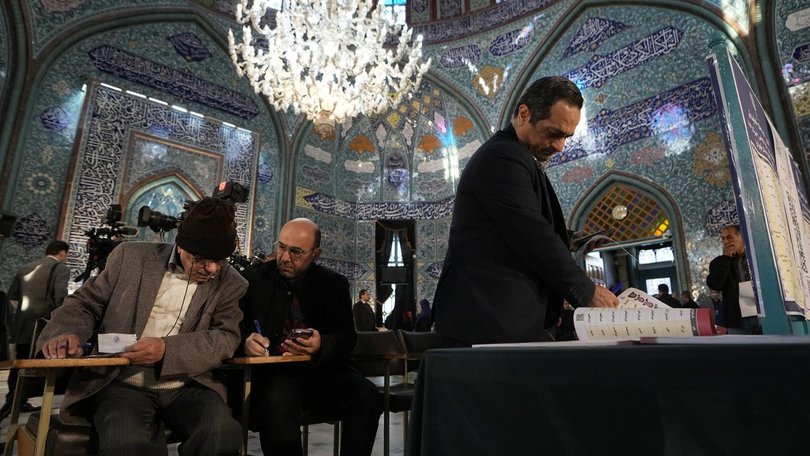Iran votes for new president amid voter apathy
Polls have closed in Iran's presidential election, after an apparent low turnout linked to public discontent at the country's restrictions.

Iranians have voted for a new president following the death of Ebrahim Raisi in a helicopter crash last month, choosing from four candidates loyal to the supreme leader.
The election comes at a time of growing public frustration reflected in low turnouts, regional tensions over the war in Gaza, and increased western pressure over Iran’s nuclear program.
The clerical establishment needed a high turnout to offset a legitimacy crisis fuelled by public discontent over economic hardship and curbs on political and social freedom.
Sign up to The Nightly's newsletters.
Get the first look at the digital newspaper, curated daily stories and breaking headlines delivered to your inbox.
By continuing you agree to our Terms and Privacy Policy.Polling ended at midnight in Iran after being extended three times for a total of six hours.
While the election is unlikely to bring a major shift in the Islamic Republic’s policies, its outcome could influence the succession to Ayatollah Ali Khamenei, Iran’s 85-year-old supreme leader, in power since 1989.
A hardline watchdog body made up of six clerics and six jurists aligned with Khamenei vets candidates, and approved only six from an initial pool of 80. Two hardline candidates subsequently dropped out.
Three candidates are hardliners and one is a low-profile comparative moderate, backed by the reformist faction that has largely been sidelined in Iran in recent years.
A source close to the moderate candidate, Massoud Pezeshkian, said, “So far, from the votes counted in small towns and villages, Pezeshkian has got around 3 million votes.”
Prominent among the remaining hardliners are Mohammad Baqer Qalibaf, parliament speaker and former commander of the powerful Revolutionary Guards, and Saeed Jalili, a former nuclear negotiator who served for four years in Khamenei’s office.
While some insiders predicted a turnout around 50 per cent, witnesses told Reuters that polling stations in Tehran and some other cities were not crowded.
In the 2021 presidential election, only 48 per cent of voters participated and turnout plumbed a record low of 41 per cent in a parliamentary election in March.
All four candidates have vowed to revive the flagging economy, beset by mismanagement, state corruption and sanctions re-imposed since 2018, after the United States ditched Tehran’s 2015 nuclear pact with six world powers.
Pezeshkian is faithful to Iran’s theocratic rule, but advocates detente with the West, economic reform, social liberalisation and political pluralism.
“We will respect the hijab law, but there should never be any intrusive or inhumane behaviour toward women,” Pezeshkian said after casting his vote.
He was referring to the death of Mahsa Amini, a young Kurdish woman, in 2022 while in the custody of morality police for allegedly violating the mandatory Islamic dress code.
The unrest sparked by Amini’s death spiralled into the biggest show of opposition to Iran’s clerical rulers in years.
In the past few weeks, Iranians have made wide use of the hashtag #ElectionCircus on X, with some activists at home and abroad calling for a boycott, saying a high turnout would only serve to legitimise the Islamic Republic.
In the 2022/23 protests, more than 500 people including 71 minors were killed, hundreds were injured and thousands arrested, rights groups said.
